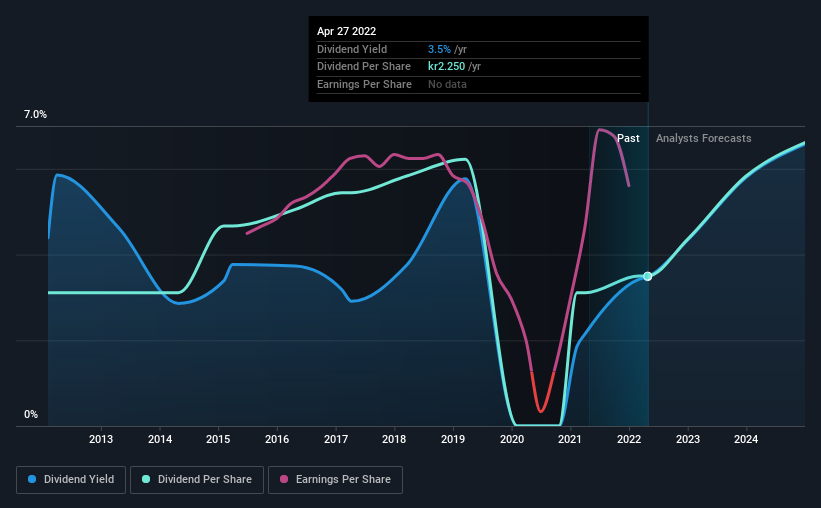The board of Bulten AB (publ) (STO:BULTEN) has announced that it will be increasing its dividend on the 5th of May to kr2.25. This will take the dividend yield from 3.5% to 3.5%, providing a nice boost to shareholder returns.
While the dividend yield is important for income investors, it is also important to consider any large share price moves, as this will generally outweigh any gains from distributions. Bulten's stock price has reduced by 30% in the last 3 months, which is not ideal for investors and can explain a sharp increase in the dividend yield.
View our latest analysis for Bulten
Bulten's Earnings Easily Cover the Distributions
A big dividend yield for a few years doesn't mean much if it can't be sustained. Based on the last payment, Bulten was earning enough to cover the dividend, but free cash flows weren't positive. We think that cash flows should take priority over earnings, so this is definitely a worry for the dividend going forward.
The next year is set to see EPS grow by 26.1%. If the dividend continues along recent trends, we estimate the payout ratio will be 25%, which is in the range that makes us comfortable with the sustainability of the dividend.

Dividend Volatility
Although the company has a long dividend history, it has been cut at least once in the last 10 years. Since 2012, the dividend has gone from kr2.00 to kr2.25. This works out to be a compound annual growth rate (CAGR) of approximately 1.2% a year over that time. We're glad to see the dividend has risen, but with a limited rate of growth and fluctuations in the payments the total shareholder return may be limited.
Bulten May Find It Hard To Grow The Dividend
Growing earnings per share could be a mitigating factor when considering the past fluctuations in the dividend. Bulten hasn't seen much change in its earnings per share over the last five years.
Bulten's Dividend Doesn't Look Sustainable
Overall, we always like to see the dividend being raised, but we don't think Bulten will make a great income stock. With cash flows lacking, it is difficult to see how the company can sustain a dividend payment. This company is not in the top tier of income providing stocks.
It's important to note that companies having a consistent dividend policy will generate greater investor confidence than those having an erratic one. At the same time, there are other factors our readers should be conscious of before pouring capital into a stock. As an example, we've identified 2 warning signs for Bulten that you should be aware of before investing. If you are a dividend investor, you might also want to look at our curated list of high yield dividend stocks.
Valuation is complex, but we're here to simplify it.
Discover if Bulten might be undervalued or overvalued with our detailed analysis, featuring fair value estimates, potential risks, dividends, insider trades, and its financial condition.
Access Free AnalysisHave feedback on this article? Concerned about the content? Get in touch with us directly. Alternatively, email editorial-team (at) simplywallst.com.
This article by Simply Wall St is general in nature. We provide commentary based on historical data and analyst forecasts only using an unbiased methodology and our articles are not intended to be financial advice. It does not constitute a recommendation to buy or sell any stock, and does not take account of your objectives, or your financial situation. We aim to bring you long-term focused analysis driven by fundamental data. Note that our analysis may not factor in the latest price-sensitive company announcements or qualitative material. Simply Wall St has no position in any stocks mentioned.
About OM:BULTEN
Bulten
Manufactures and distributes fasteners in Sweden, Poland, Germany, the United Kingdom, rest of Europe, the United States, China, and internationally.
Mediocre balance sheet with low risk.
Market Insights
Community Narratives


Recently Updated Narratives


MINISO's fair value is projected at 26.69 with an anticipated PE ratio shift of 20x


The Quiet Giant That Became AI’s Power Grid


Nova Ljubljanska Banka d.d will expect a 11.2% revenue boost driving future growth
Popular Narratives


The company that turned a verb into a global necessity and basically runs the modern internet, digital ads, smartphones, maps, and AI.


MicroVision will explode future revenue by 380.37% with a vision towards success



